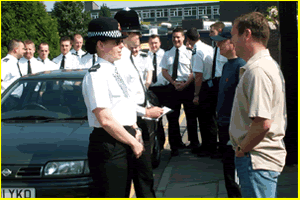





There is stigma about the police among young people. They see it as 'them and us'.
Programs such as The Bill suggest that they are corrupt and are no better than the average fraud or con. But is this the reality? Deputy Phillips of the Greater Manchester Police reveals the truth behind the uniform.
Deputy David Phillips is head of Bruche Police Training Center at Warrington Collegiate Institute.
He said: "Some people see the police force as a bit of a stigma".
So does this stigma affect the police force and does it effect the amount of young people that are recruited? Do young people misunderstand what the police force is all about?
Deputy David Phillips said: "In the last two years the government has been concentrating on recruiting young people, although this is not where the problem is. The government needs to invest in more mature police recruits as they are leaving the job."
Today's businesses want the most qualified and trained individuals and most jobs are short term. The police force offers people a long-term career and offers training to people with GCSE's and A'levels. You can earn up to £17,000 a year.
Deputy David Phillips said: "This can be very attractive, but don't let the money be the only attraction for getting into the police force as there is a wider aspect. It requires dedication, mental and physical strength and a good character."
So what does it take to become a copper?
The Could You? Web site suggests that life on the beat in the community is challenging. If you are ambitious there is many promotional opportunities.
Training is the first step. The 15 week training programme involves gaining skills in law, communications, equal opportunities, physical education, swimming and investigative abilities.
The training programme is offered to school leavers and postgraduates, depending on their intellectual capabilities. The fast-track scheme enables people without a great educational background, but with exceptional talent as a motivator or a leader, to join. A person can be promoted very quickly.
Fitness is vital and can be the difference between catching a criminal or letting them outrun you, leaving you red faced and gasping for air.
Deputy David Phillips said: "Fitness is very important to the police. On week two and fourteen of the programme the trainees go through a fitness test, which involves assessing fat levels, press ups, and strength."
This is conducted so that Deputy Phillips can measure the trainees' performance and improvements. This continues within the first two years of recruiting and then stops. If fitness is a vital requirement for the police force, why do the Greater Manchester Police disregard it at such an early stage?
He replied: "I think it is important to maintain fitness levels if you can. However, because of cost and personnel problems, putting people on these tests is costly and time-consuming. It would mean the force would have to take people off the streets to take the tests and continuously encourage them to keep fit."








